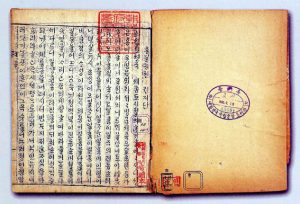By Sarah-Caire Jordan
 South Korea is coming into its own this past decade, thanks to things like K-pop, Korean TV dramas, and even make-up products becoming popular exports. In the Western world, we have seen much more about Japan and China and have come to equate that with what we know about East Asian culture in general. South Korea, however, has so much more to offer the world than bubblegum pop and cosmetics in cute packaging. Its literature is rich and very reflective of the complex culture it comes from, without all of the shiny packaging.
South Korea is coming into its own this past decade, thanks to things like K-pop, Korean TV dramas, and even make-up products becoming popular exports. In the Western world, we have seen much more about Japan and China and have come to equate that with what we know about East Asian culture in general. South Korea, however, has so much more to offer the world than bubblegum pop and cosmetics in cute packaging. Its literature is rich and very reflective of the complex culture it comes from, without all of the shiny packaging.
While a Japanese writer has won the Nobel Prize in Literature once already, and two Chinese writer have as well, it seems that South Korea should be the next country of the region to represent writers all over the world. One of the main things holding South Korean writers back, however, has to do with translation.
It isn’t that no one is interested in reading literature written by South Korean authors, it’s just that the members of the Nobel Committee aren’t as familiar with Korean as they are with Japanese and Chinese. This can be easily remedied, however, by pushing for South Korean works to get translated by experienced literary translators.
There is no lack of writers in South Korea, as it is an extremely highly-educated country. The literacy rate is a whopping 98%, but that doesn’t mean that everyone feels they can take time out of their hectic and competitive schedules to enjoy some real literature. In fact, sales of books in South Korea have been problematic enough for the government to resort to pushing their international sales. South Koreans are extremely proud of their language and the script that it is written in, but South Korean literature has gotten stuck circulating within a country that can’t make time for it.
There is finally one South Korean writer, a poet, who has been nominated for the Nobel Prize in Literature. This should be enough incentive to get government programs promoting literature within South Korea to be created, as well as push them to get more Korean translators focused on the literature of their culture. There is already an institute, the Literary Translation Institute of Korea (LTI), that is being funded by the government to spread the beauty of Korean literature and culture, but even some publicity about it would help South Korean writers immensely.
Korean literature has a lot to offer the world, as some of you may know from reading the poetry of Ko Un. We know so much about the literature of so many other countries, even though it tends to be written in another language and need translation. They are usually languages that are simpler to translate and have a larger pool of translators that work with them, however. South Korea is proving to be more of a world influence than ever, and it is time to put in the work necessary to truly be able to share its literature with the rest of the world.
For an overview of our translation expertise, visit our technical translation service page.



